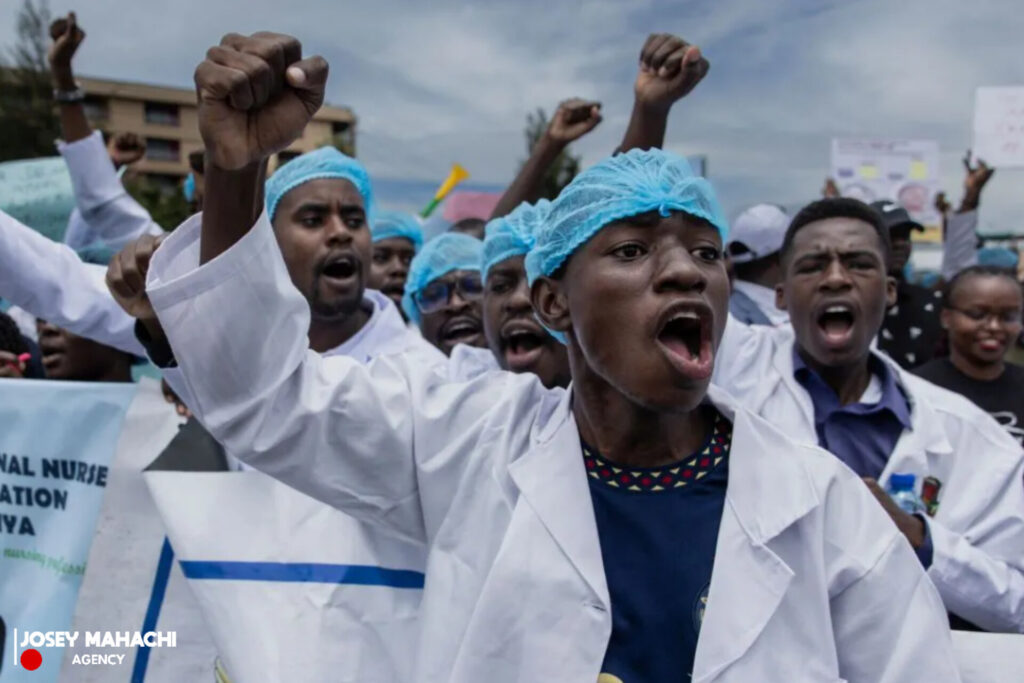By : Lloyd Mahachi
A somber mood engulfed a village in Kenya’s Rift Valley as dozens of medical interns attended the burial of their colleague, Francis Njuki, who had taken his own life. Njuki, a 29-year-old trainee pharmacist, had been struggling with feelings of exhaustion and frustration due to the non-payment of his salary by the government since he started working as an intern in August.
The Kenya Medical Practitioners and Dentists Union (KMPDU) reported that Njuki’s death was the fifth case of a medic taking their own life in the last two months due to “work-stress hardships and lack of responsive insurance cover”. The union also noted that there had been five attempted suicides by its members this year. This trend is alarming, and experts point to the stressful working conditions and poor pay as major contributing factors.
Njuki’s family revealed that he had been battling depression and had been receiving treatment. His uncle, Tirus Njuki, stated that Francis had reported hallucinations and depression due to sleep deprivation. The young intern had also written a suicide note, mentioning the four-month salary delay as one of the issues that aggravated his mental illness.
The KMPDU has been in a long-running dispute with the government over the pay and working conditions of interns. The government has proposed cutting the monthly salary of interns to $540, while the union wants it to remain at $1,600, as agreed upon in 2017. President William Ruto has stated that the government cannot afford to pay such an amount, and “we must live within our means”.
Despite the challenges, interns make up about 30% of doctors in the state health sector and do most of the work in public hospitals. They are on call, sometimes for 36 hours, and provide most of the health services that patients need. However, their morale is low due to the poor pay and working conditions.
Dr. Abdi Adow, an intern at Mbagathi Hospital in Nairobi, expressed his frustration, stating that after spending six to seven years studying, interns have to wait for several months to get an internship, only to be paid “peanuts”. Many young medics are torn between leaving the country to seek jobs overseas or abandoning their profession for better-paid careers.
The death of Dr Timothy Riungu, a pediatrician at Kenyatta National Hospital, is another example of the stressful working conditions faced by medics. He collapsed and died at home after a round-the-clock shift, having repeatedly complained of exhaustion to his supervisor. A post-mortem revealed that he had died of hypoglycemia, caused by low blood sugar levels, and had not eaten anything for over 48 hours before his death.
The KMPDU has ordered all intern doctors to stay home and issued a fresh 21-day nationwide strike notice, accusing the government of reneging on the agreement reached in May. The strike had halted operations in public hospitals, with dozens of patients reportedly losing their lives.
Dr Desree Moraa Obwogi, a 27-year-old medical intern, took her own life in September after finishing a grueling 36-hour shift. Her family has asked the government to take responsibility for her death, citing financial hardships and a “toxic” work environment as contributing factors.
Young doctors have been mobilizing on social media using the hashtag #PayMedicalInterns to push for better pay and working conditions. They marched to the offices of the Ministry of Health to vent their frustrations, stating that “our doctors and nurses shoulder the weight of a broken system, yet their cries are drowned by the greed of those in power”.
Health Minister Deborah Barasa has announced plans to introduce “robust workplace mental wellness” programs for healthcare workers nationwide to “ensure that support systems are strengthened and that those facing challenges don’t feel alone”. However, medical experts point out that many young doctors experience “moral injury”, or psychological trauma, as they feel guilty for not doing enough to treat patients, even though they tried their best under difficult conditions.
Trainee doctors told the BBC that most medical schools do not adequately address the topic of suicide, leaving new and fatigued physicians poorly equipped to deal with traumatic ordeals. Poor pay and working conditions only exacerbate the issue, leading to feelings of guilt, shame, and helplessness.
As one intern doctor put it, “A healthy doctor builds a healthy nation. When I am stressed or depressed as a doctor, I might even forget how to perform resuscitation on a patient, which could lead to loss of life.
Editor : Josephine Mahachi

